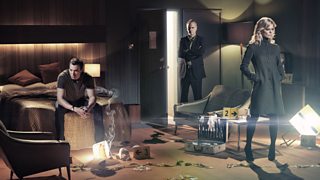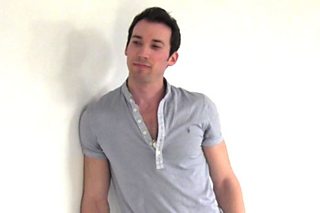Writer Tim Prager introduces series 16

Silent Witness is sixteen. It’s an astonishing run for any programme but particularly impressive for a show, which is not a soap, in fact it is not really a series in the traditional sense.
It is a collection of films with recurring characters and that may be the key to its ability to change and reinvent itself. When I was asked to become one of the writers contributing to this compilation of forensic criminal mysteries six years ago I was offered the opportunity to write “what I wanted” on subjects that were of interest and concern to me and was encouraged to consider Silent Witness as I would a feature film. The newly appointed Executive Producer at that time, Phillippa Giles, believed that current contemporary stories and filmic approaches to those stories had the capacity to keep the show fresh. In the ensuing years Silent Witness has managed to attract a small group of excellent writers with individual voices, each of whom have seized that opportunity telling stories that first rate directors have realised.
In the years since its inception, Silent Witness has seen its cast change as well. The programme once associated with Amanda Burton became the domain of Emilia Fox, Tom Ward and William Gaminara. This talented group of actors defined the programme over the past decade and were well loved by the shows large and loyal audience. When Tom Ward decided it was time for him to leave Silent Witness, he left with the gratitude of everyone involved in the show for the contribution he had made to its success. Although, I’m sure there were sighs of relief from some of the writers, me included, that we wouldn’t have to sustain Harry’s “Will they? Won’t they?” relationship with Nikki any longer! I kept arguing – and I’m sure I wasn’t alone - that we should just let them get on with it, but of course that would be relationship poison. Tom is an exceptionally talented actor and he was excellent in Silent Witness but his departure provided the opportunity to reinvent or perhaps more accurately evolve the programme once more.
Changes behind the camera are often crucial to breathing new life into a popular programme but changes in front of the camera tempt people to wonder if the programme will ever be the same again. Here’s the news flash: It won’t be. It can’t be. It has to change. With Tom’s departure, we made a number of storytelling decisions. We started by reflecting the new privatised age of forensic science and imagined the “Lyell Centre” the home of our Forensic pathologists as having to adapt to what was happening in modern Britain. Ed Whitmore, another of the show’s core writers, and I both recognised that forensic science and forensic pathology had become so closely related in today’s investigative world that we imagined a Forensic Science service that might combine the two disciplines. From that genesis the character of Jack Hodgson began to be created. One of the structural problems of the programme, something that had developed unexpectedly over the years, was that the three principle characters all did the same job creating the possibility of overlap and duplication in the storytelling. They were all cerebral characters. Emotions kept in check. You couldn’t really imagine Harry Cunningham or Leo Dalton (or indeed Nikki) getting into a punch-up. I wanted Jack Hodgson to be invested with some excess testosterone, a Northern Irishman whose flee or fight mechanism is stuck on “fight”. He would be plain speaking. We wanted him to have an edge that hadn’t been sanded away by posh education. He would be younger than Nikki and see the chance to work at the Lyell centre as an opportunity to run his own forensic science franchise. We would give him a history that included a healthy suspicion of how Police investigators use the forensic information that he provides. He would come into the team as the junior partner to Professor Leo Dalton and Dr. Nikki Alexander not their equal and he would have to fight for his place at the table.
Casting would be critical. Cast well and the new character will take root quickly – making it hard to think he hadn’t been part of the show for the past sixteen years. Series producer Sharon Bloom considered over a hundred actors for the role finally arriving at a shortlist of incredibly talented young actors. For me, one always stood out: David Caves. There was a gamble involved, however. David was a well regarded theatre actor but he hadn’t done film or television work before. Casting him involved some risk – Phillippa Giles, and Kate Harwood, Head of BBC Productions took it. He was cast.
When the first rushes came back from Anthony Byrne’s beautifully shot and directed film we realised there was no risk. David Caves was excellent. The camera captured him. He was Jack Hodgson.
When I created Jack I wanted to give him someone to talk to – a character that wasn’t anodyne; one who was physically frail in contrast to Jack’s physical strength, one who was cerebral with an acid tongue. I wanted their relationship to go beyond the functionary relaying of the next piece of evidence in the plot. I wanted to create a co-dependency and did it in the form of Clarissa Mullery, Jack’s long time assistant and forensic examiner. When introduced to Leo Dalton for the first time. Leo asks: “What do you do?”. Clarissa responds: “I make him look clever.” The casting of Liz Carr, I think, makes all of us working on Silent Witness look clever. She brings a natural wit and warmth to her performance, which enriches the programme.
The team leading Silent Witness, Executive Producer Phillippa Giles and Producer Sharon Bloom have embraced the risk of change to keep it fresh. It is a resilient programme; one that can examine a wide and varied range of story subjects. In the coming series, Leo, Nikki and Jack will identify and track an anthrax contamination which threatens our national security; they’ll play cat and mouse with a psychopathic killer, Nikki will be wooed (yes, we all agree she needs a good man) by a charismatic Science Minister while Leo tries to give some comfort to a grieving father who is looking for the cause of his son’s fatal tumour, and in the series finale the Lyell Centre’s Forensic team is asked to go to Afghanistan to investigate human remains which are thought to belong to a British soldier who has been missing for more than five years.
After sixteen years Silent Witness remains a programme that can address contemporary issues, that can entertain, thrill and move its audience. It’s been able to do this because it’s been unafraid to change. Silent Witness at sixteen has changed again and change is good.
-
![]()
Emilia Fox introduces Change
Emilia Fox introduces Change, the opening episode of series 16.
-
![]()
Video interview: David Caves
David Caves talks about his new character Jack Hodgson.
-
![]()
Audition: David Caves - scene 1
David Caves' scene 1 audition for Silent Witness series 16.
-
![]()
Audition: David Caves - scene 2
David Caves' scene 2 audition for Silent Witness series 16.




